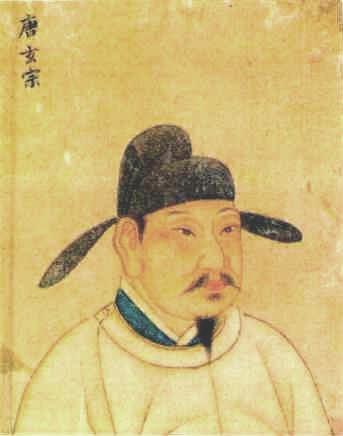Huayna Capac357
Deity
Here is my Ming Huang LH.
Ming Huang
Emperor of China
(685-762 AD)
Ming Huang was born in 685 AD in Luoyang to the emperor Ruizong. He was made Prince of Linzi and then Secretary General of Lu Prefecture in 708. In 712, Ruizong abdicated in Ming Huang's favor. During the first part of Ming Huang's reign, there was much political stability, economic prosperity, and peace in society, as well as progress in the arts, literature, music, sculpture, architecture, and painting. The emperor patronized the great poets Du Fu and Li Bai and to this day he is considered the patron of actors for his support of drama. This is considered China's golden age. Unfortunately, due to the influence of one of his concubines, Yang Guifei, a general of Turkish-Persian descent, An Lushan, was given significant power and favor in the imperial court until in 755 AD he lead a rebellion against the emperor. In 756, he abdicated in disgrace to Suzong and died 6 years later. He is remembered for his precedence over the greatest cultural period in Chinese history and for his foolish decision that lead to his decline.
Suggested traits:
Phi/Cre, favors Free Speech and Buddhism.


NOTE: This was based off a picture in a book, not the Wiki picture. Thus, there is a little discrepancy between their appearances.
Ming Huang
Emperor of China
(685-762 AD)
Ming Huang was born in 685 AD in Luoyang to the emperor Ruizong. He was made Prince of Linzi and then Secretary General of Lu Prefecture in 708. In 712, Ruizong abdicated in Ming Huang's favor. During the first part of Ming Huang's reign, there was much political stability, economic prosperity, and peace in society, as well as progress in the arts, literature, music, sculpture, architecture, and painting. The emperor patronized the great poets Du Fu and Li Bai and to this day he is considered the patron of actors for his support of drama. This is considered China's golden age. Unfortunately, due to the influence of one of his concubines, Yang Guifei, a general of Turkish-Persian descent, An Lushan, was given significant power and favor in the imperial court until in 755 AD he lead a rebellion against the emperor. In 756, he abdicated in disgrace to Suzong and died 6 years later. He is remembered for his precedence over the greatest cultural period in Chinese history and for his foolish decision that lead to his decline.
Suggested traits:
Phi/Cre, favors Free Speech and Buddhism.


NOTE: This was based off a picture in a book, not the Wiki picture. Thus, there is a little discrepancy between their appearances.




 This way Chinese LHs keep up with the US LHs!
This way Chinese LHs keep up with the US LHs!  (You might want to add a link to the DL Page.)
(You might want to add a link to the DL Page.)